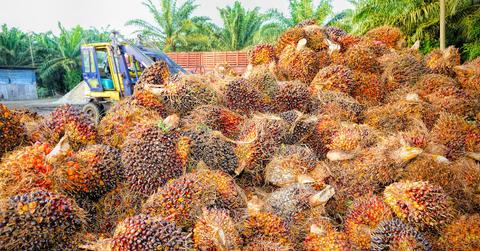New Palm Oil Guidelines Ensure Promises Translate Into Eco-Action
A new set of guidelines for palm oil producers seeks to ensure action on eco-friendly company promises, including zero deforestation, forest stratification, and identifying appropriate locations for palm oil production.
Updated May 22 2019, 4:26 p.m. ET
A new set of guidelines for palm-oil producers seeks to ensure action on eco-friendly company promises. The High Carbon Stock Approach Toolkit marks a new standard in the palm oil industry that sets standards for protecting tropical forests, identifying suitable locations for palm oil production, and ensuring that companies making eco-friendly pledges are putting their money—and might—where their mouths are.
Palm oil is one of the cheapest oils to produce, with palm trees capable of bearing fruit for more than three decades. That produces a lot of ongoing employment opportunities for work on trees that are more prolific than any other major oilseed crop. The oil produced can be used for biofuel, cooking, shortening, non-dairy creamers, in pharmaceuticals, and even cosmetics.
Indonesia, the largest supplier of palm oil globally, has also been the biggest sufferer of palm oil’s collateral damage. Tropical forests are removed to make way for palm trees, which disrupts biodiversity, ecosystems, and thousands of species, including many that are endangered. This, along with the pollution from processing the oil, has made Indonesia the third-highest emitter of greenhouse gases after China and the United States.
As palm oil demand exploded in the last several years, its producers have been vilified for the role their operations play in deforestation and habitat destruction. Public scorn has included protests, boycotts, and various other campaigns. Companies have fired back with certifications popping up labeling certain palm oil producers as sustainable and committed to zero deforestation, among other ecological pledges.
But according to the Pacific Standard, research shows that companies routinely overstate their environmental commitments and haven’t taken action on their promises. And that means deforestation targets adopted by the Consumer Goods Forum for 2020 and 2030, involving a global network of roughly 400 companies, likely isn’t going to be met.
Enter the High Carbon Stock Approach Toolkit, a new standard that may mitigate this issue. The toolkit would create a new set of standards for protecting tropical forests, identifying suitable locations for palm oil production, and ensuring that companies making eco-friendly pledges are putting their money—and might—where their mouths are.
This new methodology seeks zero deforestation, forest stratification, preservation of carbon stocks underground, and comprehensive reforestation strategies in an industry made famous for its ignorance of all four. By having an industry standard, the toolkit seeks to get into the hands of producers, traders, and workers, changing the landscape of palm oil altogether from one of unmanaged growth to deliberate sustainability.
